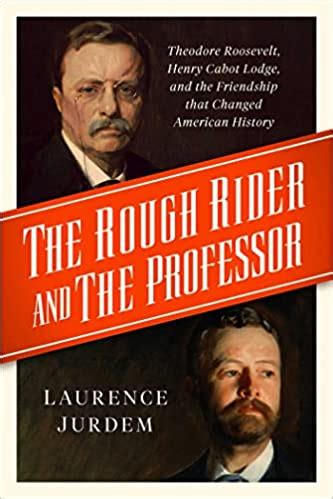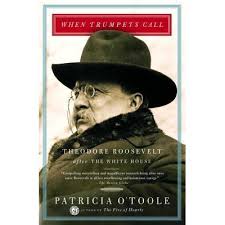Cabot and TR: Friendship For the Ages (and History Books)
One is hard-pressed to think of a more durable and historically important friendship between politicians than that between long-time Massachusetts Senator Henry Cabot Lodge and President Theodore Roosevelt. For more than forty years the two helped each other personally and professionally, and socialized, individually and with their friends and families. Of great value to the historian, they also wrote to each other all the time. The pair had an outsize impact on American politics and policy. Yet until Laurence Jurdem’s The Rough Rider and the Professor, there has never been a systematic study of their relationship. This work of popular history is a welcome and valuable contribution.
Jurdem is an adjunct professor of history at two institutions and a writer of articles and books. He knows his way around the scholarship and how to craft accessible and rigorous prose. While much has been written about Roosevelt and Lodge, the heart of The Rough Rider and the Professor is a close study of the Lodge-Roosevelt correspondence at the Massachusetts Historical Society. An indefatigable correspondent, Roosevelt’s letters crackle with energy and are well known to many scholars. He did not edit his correspondence after the fact. Lodge, trained as an historian and a professor at Harvard, was cut from a different cloth. He scrupulously edited and when he published a two volume set of his correspondence with Roosevelt, judicious trimming to present their relationship in a particular light. Accordingly, not many scholars have spent the time in Boston studying Lodge’s unedited correspondence. Happily, Jurdem put in the effort. The book highlights the deep personal connection between the two men.
Lodge, born in 1850 to a patrician New England family, was one of the first Americans to receive a PhD in history (after his law degree). Well known as a historian with many published works, Lodge surprised his family and friends by pursuing a career in electoral politics. He was in Congress for six years and represented Massachusetts in the US Senate for 31 years. Early in Lodge’s career he led an unsuccessful effort to improve voting rights for Black Americans in the south. Later in his career he led the resistance to keeping the United States out of the League of Nations. Lodge first met Roosevelt in 1884 as both men were involved in Republican politics and the potential nomination of James Blaine as presidential candidate. The hit it off immediately.
Roosevelt also came from a family known for public service. Born in 1858, Roosevelt’s biography is well-known, from his pursuit of the strenuous life after fighting childhood asthma, to the tragic death of his first wife and mother, to his time in the Dakotas and service in the US Army. He truly was a larger than life figure. Roosevelt attended Harvard years after Lodge and while they were both active in politics and public life, their paths did not cross until Lodge wrote to TR. Once they met in person, they bonded through interest in party reform, US history and politics, and a shared sense of commitment to service. Immensely talented and driven men, they forged a connection that lasted throughout the years, through agreement and disagreement, triumph and tragedy.
Jurem’s book is strongest on the early years of the friendship and the powerful ways in which party loyalty and structure shaped the arc of careers. Lodge’s age and influence were of great value to Roosevelt, whose early political aspirations were often thwarted. He was, after all, far too much of a force of nature to fit neatly into organizational strictures. Lodge knew how to play the game, how to work friendships and barter. Roosevelt was much more direct and his greatest source of agency came from the amazing ways in which he connected with people of all stripes and backgrounds. For both, and really all politically ambitious Americans at the time, knowing how best to navigate the ways and mores of party were essential. The GOP, as a big tent major party, frequently struggled with factionalism, regionalism and the pressure of this or that internal group. Being able to disagree, drive change, and yet still come together and act collectively is a skill that party membership demanded and developed.
As Lodge became more secure in the Senate and Roosevelt ascended to the presidency after the assassination of Present McKinley, their friendship remained but it was marked by understandable professional distance. Here, Jurem’s book is on less secure ground, especially as the swirl of national politics forced frequent realignments re-realignments. What stands out, however, is that the men and their families consistently found time to connect with each other.
The Rough Rider and the Professor is a well-researched and well-written joint biography of a very important friendship. Perhaps best read and appreciated by those with an interest in some background in late 1800s and early 1900s American politics, the book offers a valuable contribution to understanding American political history. It is also interesting in and of itself on the subject of friendship – what was possible then, and for the curious, what might be possible today.
David Potash

